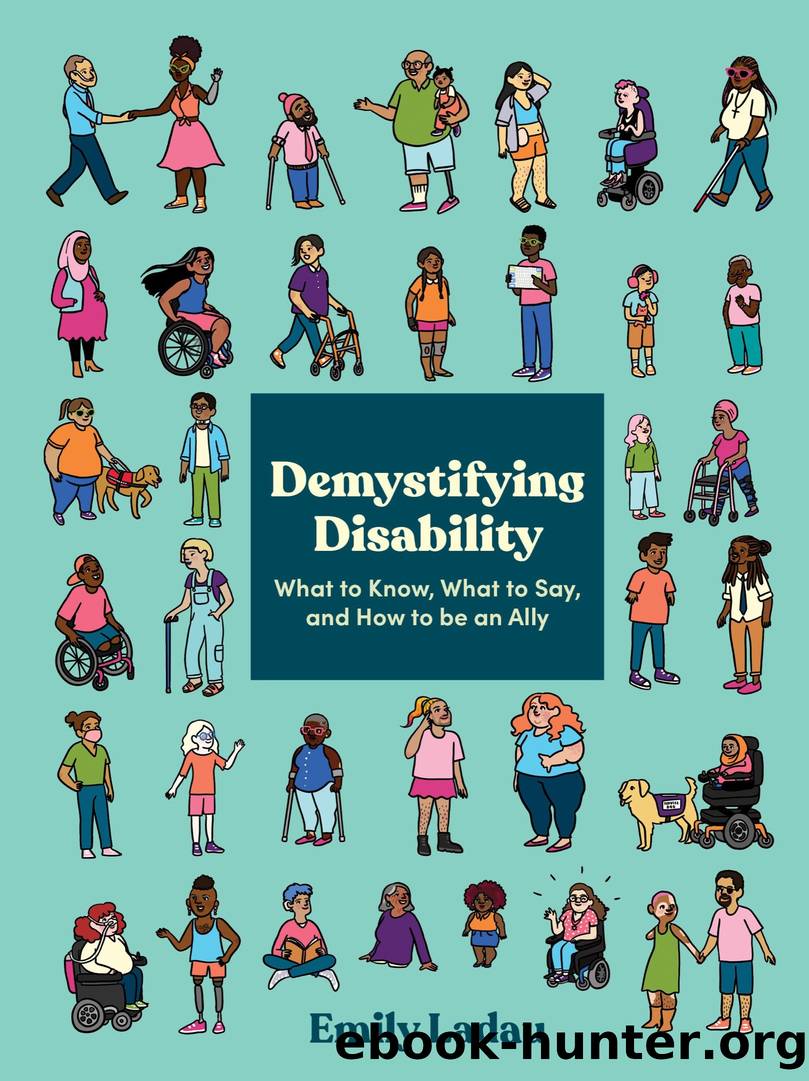Demystifying Disability by Emily Ladau

Author:Emily Ladau [Ladau, Emily]
Language: eng
Format: epub
Publisher: Clarkson Potter/Ten Speed
Published: 2021-09-07T00:00:00+00:00
Do Ask Questions When Appropriate
I know we just went over what kind of questions to absolutely avoid, but thereâs an important distinction between rude questions and acceptable ones. The difference depends on both the context in which the question is being asked and your relationship with the person youâre asking. Letâs consider a few different scenarios.
Sometimes questions arise because people are genuinely seeking information. For example, Iâm occasionally approached in public by strangers who are curious to know specific details about my power wheelchair or my wheelchair-accessible vehicle, usually because they or someone they know would benefit from the information. Iâm happy to answer questions like these because I know that information about adaptive equipment isnât always easy to come by. But not everyone is as comfortable engaging, which is okay. So if you have a legitimate question that doesnât unnecessarily invade a disabled personâs privacy, itâs best to approach and say, âMay I ask you a question aboutâ¦â instead of just blurting it out. If the person expresses that theyâd prefer not to answer, it might feel awkward, but you can simply say, âOkay, I understand,â and move on.
There are also plenty of instances in which the best etiquette is to ask, rather than to avoid, disability-related questions. When youâre planning an event, meeting, or outing, it should be standard practice to ask about accessibility needs, even if youâre not sure whether other people involved identify as disabled. If you have a certain level of familiarity with the people youâre communicating with, the ask can be informal (âHey, do you/does anyone have any accessibility needs to participate? Let me know how I can support you!â). If youâre engaging with someone you donât really know or have a more formal relationship, it can help to add a little more context to what youâre asking (âI want to make sure what Iâm planning works for you. Is there anything I can do or any accommodations you might need to make this accessible so you can fully participate?â).
Things get more personal when it comes to closer relationships. Friends and partners may have questions about certain aspects of disability, in either getting-to-know-you conversations or deeper, more intimate discussions. In these contexts, asking thoughtful questions about someoneâs disability can be a way to show that you care about the person and want to better understand who they are. Or it might educate you on how to offer support or assistance. If youâre unsure how to broach the question, it can help to preface it with something like, âIs it okay if I ask a question about your disability?â or âIâm wondering about [insert whatever youâre wondering about]. Would you be up for talking about it?â Take that initial moment to check in with the person to make sure theyâre comfortable. Open communication about personal aspects of identity is an ongoing process of building trust, so if someone lets you know theyâd rather not respond to a disability-related question, please respect that and donât push them on it.
Download
This site does not store any files on its server. We only index and link to content provided by other sites. Please contact the content providers to delete copyright contents if any and email us, we'll remove relevant links or contents immediately.
Harry Potter and the Goblet Of Fire by J.K. Rowling(3025)
Unfinished: A Memoir by Priyanka Chopra Jonas(2911)
Never by Ken Follett(2873)
The Man Who Died Twice by Richard Osman(2290)
Machine Learning at Scale with H2O by Gregory Keys | David Whiting(2267)
Fairy Tale by Stephen King(2058)
Will by Will Smith(2033)
Rationality by Steven Pinker(1761)
The Storyteller by Dave Grohl(1656)
The Dawn of Everything: A New History of Humanity by David Graeber & David Wengrow(1564)
The Dark Hours by Michael Connelly(1562)
The Stranger in the Lifeboat by Mitch Albom(1529)
Cloud Cuckoo Land by Anthony Doerr(1428)
The Becoming by Nora Roberts(1324)
Friends, Lovers, and the Big Terrible Thing by Matthew Perry(1324)
Einstein: His Life and Universe by Walter Isaacson(1312)
Crying in H Mart by Michelle Zauner(1312)
New Morning Mercies: A Daily Gospel Devotional by Paul David Tripp(1301)
A Short History of War by Jeremy Black(1295)
